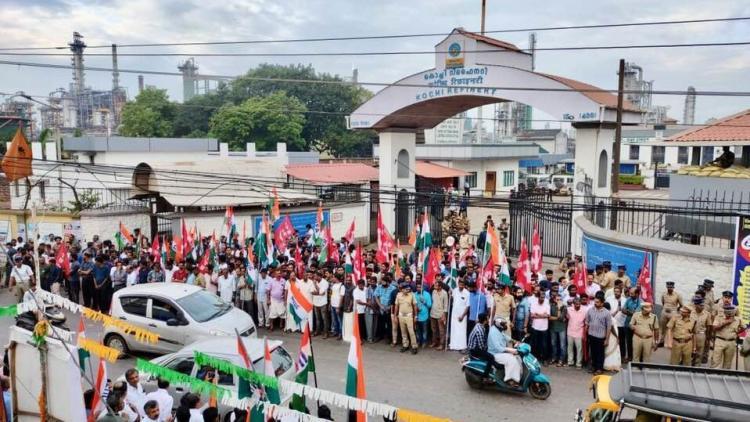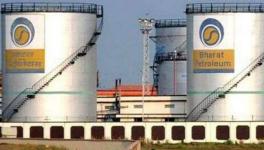Thousands of Youths in Kerala March Against Privatisation of BPCL
Aerial View The Today's March
As the Centre proceeds with the disinvestment of Bharat Petroleum Corporation Limited (BPCL) along with other public sector undertakings (PSUs), thousands of youths along with the masses marched through the streets of Kerala, especially in Kochi, in defence of BPCL and the PSUs in general on Thursday. The march, which has been called by the Democratic Youth Federation of India (DYFI), garnered support from masses including students, trade unionists, cultural activists and civil society members irrespective of the political differences.
As part of its privatisation drive, on November 20, the Centre had given in-principal approval for the strategic disinvestment of BPCL, Shipping Corporation of India, Container Corporation of India, Tehri Hydropower Development Corporation and North Eastern Electric Power Corporation Limited. Through the strategic disinvestment, the stakes of the government in these companies will be brought down to below 51% along with transfer of management control.

BPCL employees during the National Strike on November 28
“It affects our future, it affects our employment opportunities, it affects our economy. Moreover, it affects our national security. There is a history behind the nationalisation of the petroleum sector in India. During the Indo-Pak war, the then oil companies had refused to provide enough oil for the Indian fighter planes. Now, the Narendra Modi government, which made its way to power through the nationalism card, is gambling with the national security itself,” AA Rahim, state secretary of DYFI, said during the march.
Many people, raising the slogan ‘Don’t sell BPCL to private players’, joined the volunteers during the march. Apart from Kochi, many marches were carried out across the state against the privatisation drive of the BJP-led Centre.
On November 28, employees from all the public sector oil companies including BPCL and HPCL staged a nationwide strike following the call of All India Petroleum Workers’ Federation (AIPWF), National Federation of Petroleum Workers (NFPW) and Petroleum and Gas Workers’ Federation of India (PGWFI) against the privatisation of oil sector.
However, the employees of Kochi refinery have been protesting in the premises of the refinery for the past 43 days. The protesting workers demand that the BPCL should continue as a public sector entity. Many political leaders—except the ones from BJP and its allies—have visited the workers and extended their solidarity.
The Centre has 53.29% stakes in BPCL, at present. Though BPCL has four refineries—Mumbai, Kochi (Kerala), Bina (Madhya Pradesh) and Numaligarh (Assam)—Numaligarh refinery has been exempted from the disinvestment process, considering the request of the Assam state government. Meanwhile, a similar request by the Kerala government made for the Kochi refinery has remained unheeded.
The Left Democratic Front government in Kerala has proposed a plan to acquire the Kochi refinery, as it had done in the case of Hindustan Newsprint Limited (HNL) in Vellore. On November 25, concluding the legal battle for the possession of HNL, National Company Law Tribunal in its final order directed the central government to hand over the entire stakes of HNL.
The Kochi refinery, which was officially registered as Cochin Refinery Limited, had started functioning in 1963 and the then state government had acquired 350 acres of land for the refinery. However, BPCL had acquired the Kochi refinery only in 2006.
“The state government has 5% stakes in Kochi refinery alone and when it comes to overall BPCL, it is 0.8%,” B Balagopalan of Petroleum Employees Association in Kochi refinery had told NewsClick earlier.
Kochi refinery alone employs around 3,000 permanent employees and around 10,000 contractual workers. BPCL has a workforce of around 12,000 permanent workers and around 20,000 contractual workers who are regularly engaged by the company.
Read More: Disinvestment of BPCL: Global Energy Giants Eye Indian Market
BPCL, along with other two PSUs, IOCL and HPCL, control more than 75% of the Indian fuel market business. BPCL, which alone has 24% market share in the petroleum products marketing in India, owns a vast storage capacity with 77 major installations and depots for storage and distribution of petroleum products, 55 LPG bottling plants, 2,241 KM multi-product line, 56 aviation fuelling stations in airports, four lubricant plants and lubricant godowns and facilities for unloading and loading of crude. Moreover, there are 11 subsidiary companies within India and abroad, 22 joint venture companies and also shareholdings in various companies.
BPCL, which was awarded the ‘maharatna’ status in 2017, has been making profits since its inception and the PSU has reserved and surplus to the tune of Rs 34,400 crore. Based on a rough calculation, the real value of the assets of BPCL will be more than two lakh crore rupees with a large number of plots in the hearts of the prime cities across the country. Through the disinvestment drive, these properties will go to the private players for a throwaway price.
“So, DYFI will take up this issue and we will go for more intense protests. Due to the privatisation of our public sector including Air India, Indian railway along with others, we are losing the opportunities of jobs, reservation and the job security itself. So, our fight will be for the coming generations as well,” Rahim added.
Read More: Disinvestment Drive: Assam’s Concerns over Numaligarh Refinery Heard, Kerala’s Neglected
Get the latest reports & analysis with people's perspective on Protests, movements & deep analytical videos, discussions of the current affairs in your Telegram app. Subscribe to NewsClick's Telegram channel & get Real-Time updates on stories, as they get published on our website.
























